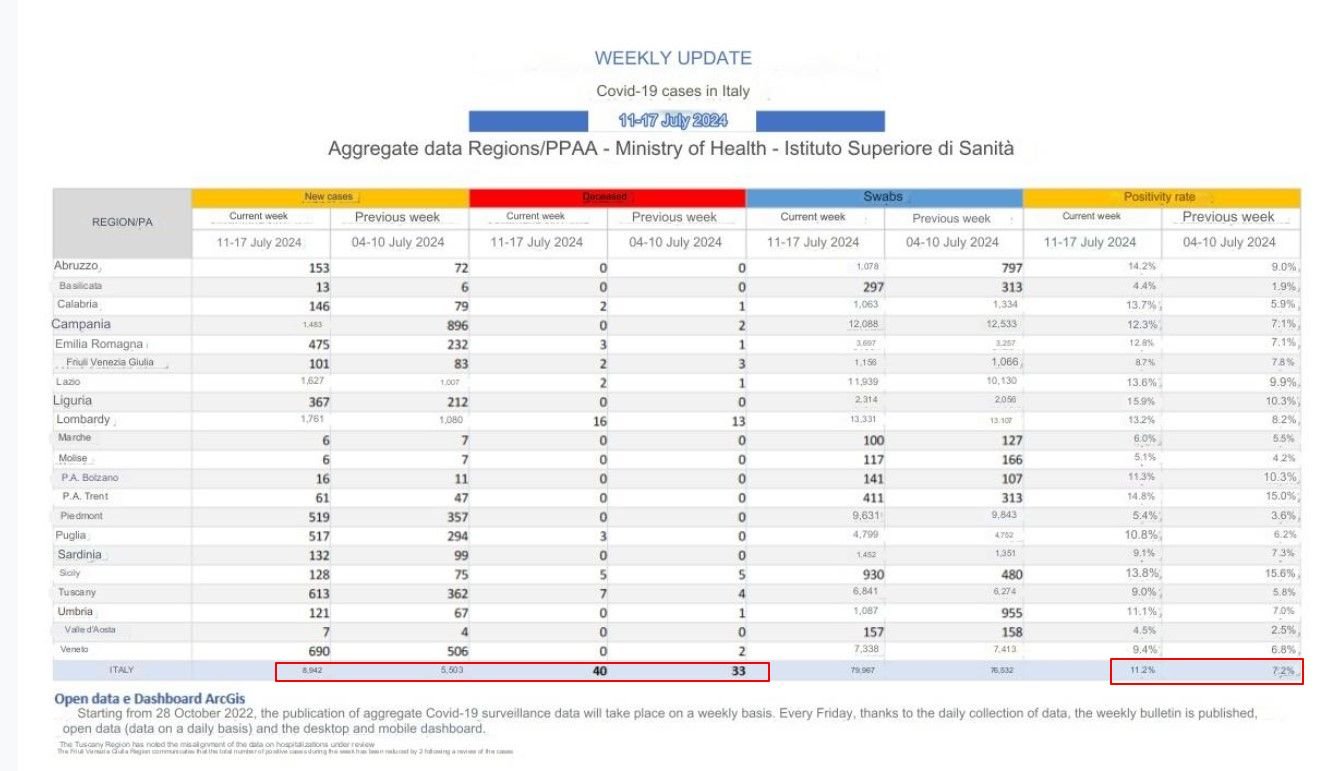-
Posts
36,970 -
Joined
-
Last visited
-
Days Won
6
Content Type
Events
Forums
Downloads
Quizzes
Gallery
Blogs
Everything posted by TallGuyJohninBKK
-
Jul 23, 2024 PARIS - French and Australian officials on Tuesday played down the risk of a COVID cluster at the Paris Olympics after the Australia team was the first to report that one of its athletes, a water polo player, had tested positive and been isolated. Paris 2024 is meant to be the first post-pandemic summer Olympics, after the 2020 Tokyo Olympics, postponed by a year due to COVID, were held largely without spectators. "I need to emphasise that we are treating COVID no differently to other bugs like the flu. This is not Tokyo," Australia's Olympic team chief Anna Meares told a press conference. Meares said the athlete's teammates would wear masks and adhere to social distancing measures. All close contacts were tested. ... A second Australia player, who was a close contact, later tested positive as well, the Australian Olympic Committee said, but no other athletes in the country's team have been diagnosed with COVID. (more) https://www.straitstimes.com/sport/australian-water-polo-player-isolated-with-covid-team-chief-says
-

Periodic COVID updates for Japan
TallGuyJohninBKK replied to TallGuyJohninBKK's topic in COVID-19 Coronavirus
Japan battling 11th COVID wave, data shows, as KP.3 variant evades immunity Jul 24, 2024 Japan appears to be experiencing its 11th wave of COVID-19 infections, with new infections increasing for 10 consecutive weeks amid the rise of a highly transmissible new coronavirus variant. ... COVID-19 cases have been increasing since early May. The total number of new cases in regularly monitored medical institutions across the country reached 55,072 in the week through July 14, according to the ministry. ... On Monday, the ministry held a hearing with experts on the nationwide infection situation and the state of medical services. Although the country is not currently facing a medical crisis, experts urged people to remain vigilant against COVID-19 infections. "Elderly people and those with underlying conditions are at high risk of developing severe symptoms if infected," a ministry official said. (more) https://www.japantimes.co.jp/news/2024/07/24/japan/science-health/covid-19-11th-wave/ -

Periodic COVID updates for England
TallGuyJohninBKK replied to TallGuyJohninBKK's topic in COVID-19 Coronavirus
Weekly COVID deaths in England, with the latest weekly update above, continue to be about double the comparable weekly numbers for the same period last year in 2023: ... https://ukhsa-dashboard.data.gov.uk/topics/covid-19#deaths -

Periodic COVID updates for England
TallGuyJohninBKK replied to TallGuyJohninBKK's topic in COVID-19 Coronavirus
Here's the charts from the latest UKHSA weekly COVID update for England as of July 25: My text summary - weekly COVID new cases, weekly COVID deaths, and COVID testing positivity rates (7-day rolling average) all increased vs. the prior week's report (as posted above as of July 18). There was no updated data for COVID new hospital admissions since the prior weekly report. Versus the prior weekly report: --COVID reported weekly cases increased from 3,382 to 3,557 --COVID weekly deaths increased from 163 to 197, the highest weekly total since late February --COVID testing positivity rate (7-day rolling average) increased from 13.9% to 15.9% https://ukhsa-dashboard.data.gov.uk/ https://ukhsa-dashboard.data.gov.uk/topics/covid-19#deaths Weekly COVID deaths from the most recent weekly low in May: Deaths data for deaths with COVID-19 on the death certificate in England Up to and including 12 July 2024 Date -- Amount 12 Jul 2024 -- 197 5 Jul 2024 -- 163 28 Jun 2024 -- 171 21 Jun 2024 -- 145 14 Jun 2024 -- 155 7 Jun 2024 -- 146 31 May 2024 -- 113 24 May 2024 -- 147 17 May 2024 -- 168 10 May 2024 -- 93 https://ukhsa-dashboard.data.gov.uk/ https://ukhsa-dashboard.data.gov.uk/ https://ukhsa-dashboard.data.gov.uk/topics/covid-19#testing -
The global COVID deaths these days, 4-1/2 years into the pandemic and after 7 million official and up to 30 million COVID excess deaths prior, are predominantly among the elderly. But over the duration of the pandemic, the age distribution hasn't been so lopsided as your comments above suggest. Look at the official age breakdown for COVID deaths in the U.S. from the start of the pandemic in 2020 through Sept. 2023 as one example -- almost 278,000 deaths, or 24%, in the under age 65 cohorts. https://www.cdc.gov/nchs/nvss/vsrr/covid_weekly/index.htm#SexAndAge
-
The Taiwan CDC reported Tuesday that the country's new COVID deaths increased again during the past week to 124, while new serious COVID cases (hospitalizations) declined for a second straight week to 773. The CDC, as with past weeks, said most of the serious cases and new COVID deaths involved the elderly age 65 and above. Week Ending -- Severe COVID cases -- COVID Deaths June 17 -- 624 -- N/A June 24 -- 817 -- 40 July 1 -- 932 -- 64 July 8 -- 987 -- 99 July 15 -- 896 (revised) -- 104 July 22 -- 773 -- 124 Noting that regional neighbor Japan likewise has been having a COVID surge amid the peak summer travel season, the Taiwan CDC urged its citizens planning to travel to Japan, and senior citizens in general, to be up-to-date with the latest available XBB COVID vaccine, and to practice personal hygiene habits such as frequent hand washing and wearing face masks when in crowded or poorly ventilated places. Source:
-

Thai police refute claims of substandard bulletproof vests
TallGuyJohninBKK replied to snoop1130's topic in Thailand News
I knew one officer who was going to send his in for inspection... But by the time he got around to trying to do it, the termites at eaten the whole thing! (joking....) 🤪 -
I remember going to the Nana Hotel disco a few times 20+ years ago during my earliest tourist visits to Thailand, because while not great, it actually was a Thai disco where people, including Thai young women, danced on a dance floor instead of just standing around tables. Many years later, I tried the Nana Hotel coffee shop a few times for their cheap western all-you-can-eat buffet breakfast, which included things like pancakes which are nice to have from time to time.... But the place always had a bit of a creepy feeling for me, so I didn't hang around long. Never stayed overnight at the hotel. Couldn't trust the pillows! 🙂
-
What's wrong with what led up to the fatal shooting and hostage-taking here: "Boonma, who had known mental health issues," AND "Boonma, known to be a gun enthusiast, had an arsenal of weapons, including four pistols and a shotgun."
- 9 replies
-
- 11
-

-

-
This report from July 20 seems a bit more clear than the Thai PBS report, and makes no mention of any current / pending plans for increasing the FT (fuel tariff) component, which was what was going to drive the earlier talk about electric rate increases: Thailand’s Minister of Energy scolds media and confirms no rise in electricity prices from September to December 2024, keeping rates stable at ฿4.18 per unit. The government remains committed to reducing electricity costs to support consumers and industry amidst economic challenges. Deputy PM assures public of stable electricity prices amidst economic concerns in Thailand On Saturday, Mr. Pirapan suggested that the current price of ฿4.18 was likely to remain the same. The government reviews the country’s electricity tariff every four months as part of its energy framework. https://www.thaiexaminer.com/thai-news-foreigners/2024/07/20/minister-confirms-hold-on-electricity-prices-as-government-policy-aims-for-cheaper-tariffs/ Which would be consistent with the actual OP headline of this thread: Electricity price for September-December to remain at the current rate
-
I'm struggling to understand, from the OP report here, just what is the bottom line re electric rates for the last quarter of this year.... They're saying the base rate won't rise, but not yet deciding on or ruling out an increase in the added fuel tariff -- which itself would drive an increase in the overall cost of electricity to consumers if the FT were to be raised???
-
COVID-19 Reported Patient Impact and Hospital Capacity by State Timeseries After May 3, 2024, this dataset and webpage will no longer be updated because hospitals are no longer required to report data on COVID-19 hospital admissions [emphasis added], and hospital capacity and occupancy data, to HHS through CDC’s National Healthcare Safety Network. https://healthdata.gov/Hospital/COVID-19-Reported-Patient-Impact-and-Hospital-Capa/g62h-syeh/about_data
-
Thailand MoPH Weekly COVID report for July 14 - 20, 2024: For the most recent week, new COVID hospitalizations increased slightly, but declines occurred in new COVID deaths and currently hospitalized COVID patients in serious condition and those requiring ventilation to breathe. --1,067 new COVID hospitalizations, averaging 152 per day, up 63 / 6.3% from 1,004 the prior week --3 new COVID deaths, down 2 / -40% from 5 the prior week --589 current COVID patients hospitalized in serious condition (pneumonia symptoms), down 93 / -13.6% from 682 the prior week (dark purple) --265 current COVID patients hospitalized requiring intubation/ventilation to breathe, down 44 / -14.2% from 309 the prior week (light purple) --------------------------------------- The reported 1,067 new COVID hospitalizations last week, averaging 152 per day, remained more than double the weekly number (501) from mid-March at the start of Thailand's spring 2024 COVID surge. Cumulative officially reported figures since the start of 2024 are COVID hospitalizations (34,653) & COVID deaths (191). Of the three official COVID deaths for the past week, the MoPH is reporting that two were male and one female. By age, two were ages 70 and above, and one was age 60-69. https://ddc.moph.go.th/covid19-dashboard/?dashboard=main The weekly new COVID hospitalization totals since this year's spring surge began in mid-March have been: March 16 -- 501 March 23 -- 630 March 30 -- 728 April 6 -- 774 April 13 -- 849 April 20 -- 1,004 April 27 -- 1,672 May 4 -- 1,792 May 11 -- 1,880 May 18 - 1,882 May 25 -- 1,801 June 1 -- 1,863 June 8 -- 2,762 June 15 -- 2,881 June 22 -- 1,823 June 29 -- 3,256 July 6 -- 1,377 July 13 -- 1,004 July 20 -- 1,067 By comparison, Thailand's key weekly COVID indicators to start 2024 were 664 new COVID hospitalizations and 4 COVID deaths for the first week of the year.
-
I would not limit my decisions on that subject to just "places where homosexuality is outlawed," but would cast a broader net. I'm not gay, but I firmly support gay and other so-called minority group civil rights. So places that are strongly antagonistic to those core principles and values would be off my travel to-visit list, including places in the U.S. like the DeSantis-headed state of Florida. Never been, and have always wanted to see DisneyWorld etc., but ain't gonna happen as long as he's running the show there and his policies prevail. https://www.forbes.com/sites/alisondurkee/2023/07/10/desantis-controversial-policies-spark-florida-convention-cancellations-as-tourism-shows-signs-of-slowing/ https://www.cnn.com/2023/08/06/economy/florida-convention-business-cancellations/index.html
-
American Academy of Pediatrics analyzes pediatric COVID-19 hospitalizations from 2020-’24 July 1, 2024 About 234,000 children under age 18 were hospitalized with confirmed cases of COVID-19 from fall 2020 to spring 2024, according to AAP analysis of data collected by the U.S. Department of Health and Human Services (HHS). ... The number of COVID-19 hospitalizations varied substantially across time by waves of infection and emergence of new variants (see figure). The largest peak was in winter 2022 during the omicron surge, with 6,527 child hospitalizations the week of Jan. 15. In the final week of the report, April 27, 2024, 310 children with a confirmed COVID-19 case were admitted, among the lowest levels reported during the pandemic. Starting in January 2022, HHS also required hospitals to break out child admissions by age group (0-4 years, 5-11 years and 12-17 years) in their weekly reports. While children ages 0-4 comprise about 26% of the U.S. child population, they accounted for 58% of the confirmed COVID-19 [juvenile] hospital admissions from January 2022 to April 2024. This may be related to greater vulnerability or to lower vaccination levels among this age group. (more) https://publications.aap.org/aapnews/news/29182
-
A separate report from the Adnkronos news agency provided a bit more detail in terms of current COVID hospitalizations, rising for the week to 1,183 COVID cases hospitalized and 43 in ICU, but mostly involving the elderly: Covid, last week's data: incidence growing, Rt above epidemic threshold July 19, 2024 ... "Quiet situation on the hospitalization front . "On 17 July - the monitoring reports - the occupancy of beds in the medical area was 1.9% (1,183 hospitalised), substantially stable compared to the previous week (1.6% on 10 July). The occupancy of beds in intensive care, equal to 0.5% (43 hospitalized), compared to the previous week (0.5% on 10 July)". The incidence is increasing in most age groups, with the highest rate in the 80-89 and over 90 age groups, which still emerges from monitoring. The median age at diagnosis is 61 years, a slight decrease compared to the previous week. The rate of reinfections is around 49%, slightly increasing. The highest hospitalization rates (both in the medical area and in intensive care), as well as the highest mortality rates, concern those aged 80-89 and those aged over 90." https://www-adnkronos-com.translate.goog/salute/covid-italia-oggi-dati-bollettino-19-luglio-2024_3NhwQQZ4vWd679PxEn1rNM?_x_tr_sl=auto&_x_tr_tl=en&_x_tr_hl=en?refresh_ce
-
Because of the foreign language news reporting issues, there doesn't appear to be a single comprehensive news article in English that spells all this out regarding Italy, which has a population of about 59 million, and thus is somewhat smaller in population than both Thailand and the U.K.... So let me try to piece things together with various sources, as follows: 9,000 new infections over past week 19 July 2024 ... https://www.ansa.it/english/news/general_news/2024/07/19/covid-19-cases-slightly-up-the-frail-must-be-protected-vaia_b76301d3-aaa8-4df5-b212-6d57eef1e147.html Covid Italy, 9 thousand infections in 1 week: Campania, Lazio and Lombardy with more cases This is 62% more than the previous 7 days. Vaia: "Situation under control" July 19, 2024 "There were almost 9 thousand (8,942) Covid infections recorded in Italy in the week between 11 and 17 July, 62% more than in the previous 7 days when there were 5,503 cases. There were 40 deaths, compared to 33 the previous week (21% more). This is what the updated bulletin of the Ministry of Health reports on the progress of Covid in the country. The regions with the most infections There are 3 regions that exceed the thousand registered infections : Lombardy remains in the lead with 1,761 cases, followed by Lazio with 1,627 positives and Campania with 1,483. The [testing] positivity rate at a national level is equal to 11.2% - calculated on a total of 79,967 swabs performed (there were 76,532 last week) - and rises by 4 percentage points compared to that of the previous 7 days (7.2%) . (more) https://www-adnkronos-com.translate.goog/cronaca/covid-oggi-italia-contagi-crescita-regioni-piu-casi_5eovDM4tc2292FbRPCdDDY?_x_tr_sl=auto&_x_tr_tl=en&_x_tr_hl=en?refresh_ce The above news report is borne out by the Google Translate English translation of the Italian Ministry of Health's latest weekly COVID report for July 11-17, as follows: https://www.salute.gov.it/imgs/C_17_bollettini_98_fileBollettino.pdf This news report below from earlier in July adds some background on how Italy's officially recorded COVID infections have grown recently from levels that until recently were in the 2,505 to 3,855 range, based on the government's weekly reporting: Covid Resurgence in Italy: New KP3 Subvariant Drives Summer Case Spike updated: 11 July "Covid has resurfaced in Italy, causing a growing number of cases that are nearing the summer peak. The KP3 subvariant appears to be responsible for this new mini-wave. ... The Peak of Cases According to the latest weekly bulletin published on the Ministry of Health website, from June 27 to July 3, there were 3,855 new positive cases, up from 2,505 from June 20-26. Deaths decreased from 21 to 18. [emphasis added] The number of tests increased from 79,339 to 81,900 and the positivity rate rose from 3.2% to 4.7%. “With the arrival of autumn and then winter, when the virus will be more prevalent - suggests the infectious disease specialist - it is important to prepare a good vaccination campaign.” ... The Predominant Variant Contracting this variant is like having a very severe cold, with fever lasting four to five days. It is a VOI (variant of interest) due to mutations in the Spike protein that the virus uses to enter cells. This means that this variant can lead to serious complications (respiratory difficulties) as it can more easily evade immune defenses, penetrate cells, and replicate faster than other variants. The continuous and rapid growth observed in various countries could confirm this tendency of JN.1 to be more transmissible and more effective in evading the host's immune system. https://www.ilmessaggero.it/en/covid_resurgence_in_italy_new_kp3_subvariant_drives_summer_case_spike-8230689.html#
-
(KRON) — A heated exchange between Elon Musk and Senator Scott Wiener ensued on X over AB1955, a law that supports LGBTQ youth by increasing support for students, including allowing California school districts to choose not to disclose a child’s sexual orientation to their parent. The exchange started on Tuesday. Musk reposted an article announcing AB1955’s passing, commenting, “The state will take away your kids in California.” For the following days, Musk hunkered down on his stance, claiming the goal of this “diabolical law” is to “break the parent-child relationship and put the state in charge of your children.” ... In reply, Wiener defended the bill by claiming California is responsible for much of Musk’s success and that “Elon Musk is a textbook example of why kids shouldn’t be forced to come out to their parents.” Wiener continued, “Will this be a fake temper tantrum move just like Tesla’s fake “move” to Texas?” (more) https://www.msn.com/en-us/news/us/ab1955-elon-musk-sen-scott-wiener-have-heated-debate-over-new-ca-law/ar-BB1qlSvZ Gov. Newsom signs first-in-nation bill banning schools’ transgender notification policies AB1955 will stop school districts from notifying parents if their child starts using different pronouns or identifies as a different gender than what’s on their school record. https://www.mercurynews.com/2024/07/15/newsom-signs-first-in-nation-bill-banning-schools-transgender-notification-policies/ Elon Musk to Move Tech Headquarters to Texas Following California's New Transgender Measure https://aseannow.com/topic/1333162-elon-musk-to-move-tech-headquarters-to-texas-following-californias-new-transgender-measure/#comment-19072107
-
The headline used on this thread is exactly the headline used by the Associated Press on their news report article that is the OP here. That's the way it's supposed to work... use the original news article headline, not something we make up on our own. Perhaps the AP decided to focus on the Nazi salute in their headline and lead of this article because of the convicted person's history as spelled out in the same OP article... "Dykes ... previously was convicted of a crime stemming from the 2017 white nationalist Unite the Right rally in Charlottesville, Virginia."
-
Try reading the actual news report: "Tyler Bradley Dykes, of South Carolina, was an active-duty Marine when he grabbed a police riot shield from the hands of two police officers and used it to push his way through police lines during the attack by the mob of then-President Donald Trump's supporters on Jan. 6, 2021. Dykes, who pleaded guilty in April to assault charges, ..."
-
Perfect fit to be second-fiddle running mate to Trump, considering the later's determined escape from military service. Donald Trump avoided the military draft 5 times, but it wasn't uncommon for young men from influential families to do so during the Vietnam War President Donald Trump received military draft deferments five times — once for bad feet and four times for college. Thanks in part to the deferments, he did not serve in Vietnam. The president has received criticism for dodging the draft, including from members of Congress. Democratic Sen. Tammy Duckworth, a Purple Heart recipient, once called him "Cadet Bone Spurs." https://www.businessinsider.com/donald-trump-avoided-the-military-draft-which-was-common-at-the-time-vietnam-war-2018-12






















